8/11/2014
Virginia Court Limits Windshield Obstruction TicketsCourt of Appeals in Virginia stops police from making traffic stops based on a parking pass hanging from the rearview mirror.

Thousands of motorists are ticketed in Virginia every year for having a "windshield obstruction" such as a GPS unit or a small item hung from the rearview mirror. The state Court of Appeals on Tuesday significantly curtailed this practice after finding the police were wrong in the case of Loren Anthony Mason Jr, a passenger in a car stopped in Sussex County in the afternoon of March 3, 2012.
Waverly Police Officer Willie Richards had been hiding on the side of the road with his radar gun, looking for potential citations when he saw a vehicle pass that had an object dangling from the rearview mirror. He thought he had an easy ticket.
The car had a three inch by five inch Ft. Lee employee parking pass issued by the Department of Defense hanging behind the rearview mirror. Virginia law on windshield obstructions appears straightforward.
"It shall be unlawful for any person to drive a motor vehicle on a highway in the Commonwealth with any object or objects, other than a rear view mirror, sun visor, or other equipment of the motor vehicle approved by the superintendent, suspended from any part of the motor vehicle in such a manner as to obstruct the driver's clear view of the highway through the windshield," Virginia Code Section 46.2-1054 states.
Before Officer Richards handed the driver, Tony Jarrett, a ticket for the "obstruction" and failure to wear a seatbelt, he ordered him out of the car so he could pat him down for weapons. After Jarrett consented, a bag of marijuana was discovered in his back pocket.
The rest of the car was searched, turning up more contraband. Mason appealed his conviction for possession, arguing that the initial traffic stop based on the windshield was invalid. At trial, the judge asked Officer Richards whether he verified his public safety concern by looking through the windshield of the car while he was searching inside it.
"No, ma'am," Officer Richards testified. "Not to see -- not to determine, you know, whether I could see out of the window or not where the dangling object was, no, ma'am."
State prosecutors argued that any danging object, no matter how small, justifies a traffic stop. While the trial judge agreed that the parking pass would not be an obstruction "on any car in America," she agreed with the state that anything dangling could be considered reasonable suspicion for a stop. The three-judge appellate panel found this strict interpretation directly conflicts with the statute.
"Code Section 46.2-1054 proscribes only suspended objects that obstruct the driver's clear view of the highway," Judge Robert J. Humphreys wrote for the majority. "What exactly constitutes an obstruction of the clear view of the highway is not specified by the statute. What is clear is that the statute does not proscribe all objects suspended from the interior of a motor vehicle. If the General Assembly had intended to proscribe all objects suspended from any part of a motor vehicle, it would have said so."
The majority held that there must be some evidence of actual obstruction to conduct a traffic stop, otherwise there would be no particularized suspicion of an offense. They argued that it would allow police to detain just about anyone given the common items hung from windshields. The majority chided Officer Richards for stopping someone for conduct that "to the untrained eye appears to be wholly innocent."
"Some are purely decorative such as the iconic 'fuzzy dice' or hold personal or sentimental meaning such as a graduation tassel or rosary beads, while still other objects have utilitarian uses such as GPS devices, toll transponders, air fresheners or, as in this case, parking permits," Judge Humphreys wrote. "Significantly, these items are permitted to be attached to a vehicle unless they are of a size or positioned in such a way as to impair the ability of the driver to view the road."
Mason's case was remanded for a new trial. A copy of the ruling is available in a 200k PDF at the source link below.


